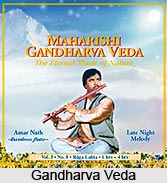 Gandharva Veda is an appendix to Sama Veda which contains 36000 slokas. The Aryans in the Rig Vedic age were extremely fond of music hence it got due prominence during that age. It is well known that sage Narada was proficient in the art of music and was skilled in playing the harp also.
Gandharva Veda is an appendix to Sama Veda which contains 36000 slokas. The Aryans in the Rig Vedic age were extremely fond of music hence it got due prominence during that age. It is well known that sage Narada was proficient in the art of music and was skilled in playing the harp also.
Music in Gandharva Veda
Legend has it that sage Bharata was the creator of the seven notes of music and drama. The seven notes of music sa, re, ga, ma, pa, dha, and ni were derived from the three Vedic notes, Udatta, Anudatta, and Svarita. They are however now known as as Udara, Mudara and Tara. Udatta meaning the gravely accented tune gave birth to nishada and gandhara. Anudatta meaning lowly accented tune gave rise to rishaba and dhaivata. Svarita meaning prolate was the origin of the sharja, madhyama and panchama. Vedic Siksha which is the laws of phonetics explains the dominance of Vedic seers over music. Earlier these Vedic hymns were sung in choir in various families. The Rig Veda signifies the presence of social singing, dancing, musical instruments and sonorous prayers during the earlier feasts. Seer Madhuchchanda, son of Vishwamitra also mentions about these rituals in the Rig Veda.
During the Vedic period there was a scarcity of musical instruments. Only few instruments were in use. A harp called ksheni and drums called karkan were few of the earliest instruments used. During this time scenic representation of plays along with dance was also initiated. Drama in Sanskrit called Nataka also formed an essential part in the Rig Vedic age. According to legend Bharata enacted the first play titled `Lakshmi-Svayamvaram` in front of the Devas. Even the Aryans played music in various rituals, sacrifices, marriages, coronations, feasts, and evening parties.
Legend has it that our foremost dramas were evolved from Indra-dhvaja or the jarjara puja festival. It is also said that the earlier Natyashastra was based on the much older Gandharva Veda but there are no copies of these Vedas left. During the Indra puja in the north the common people used to celebrate their festival with much pomp. They would drink their fill, sing and dance and entertain themselves with various performances pertaining to popular themes. Lord Brahma influenced by their festivity initiated a new subject for entertainment called Natya-Veda. He also imparted the lessons on it to sage Bharata. The later then formed a group and instructed them on the various forms of dramatic art. Along with this on the proposal of Lord Shiva dance was also added to it. Together all the elements like dialogues, songs, dance, performance and sentiments formed the chief elements of dramas.
Earlier sage Bharata along with Devas, vidyadharas, apsaras and others performed dramas in heaven. With time they became proficient in this art and composed plays on their own. The first play that was enacted in heaven was titled as `The Defeat of the Asuras.` During the play the Asuras created disturbances hence
Lord Visvakarman erected a theatre hall. He also a placed a guard fro protection. The theatre was well constructed and equipped with a big stage, galleries and a dressing room. Later they enacted many plays. The lunar king Nahusha was so impressed by the plays that he even instituted it in his court. Sage Bharata`s disciples, Kolahala, Vatsa, Sandilya and Dhurtita enacted plays in different parts of India. India.



















